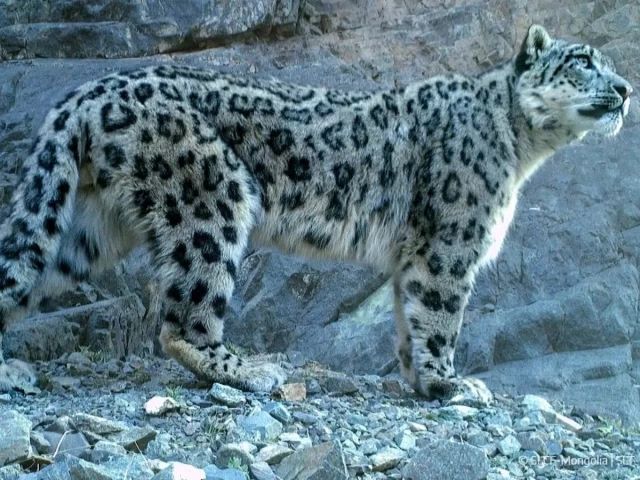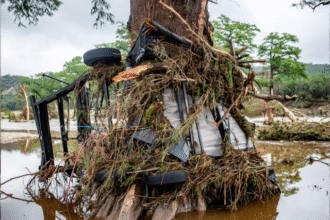As the world marked International Day of the Snow Leopard on Thursday, Pakistan reaffirmed Pakistan’s commitment to protecting the endangered snow leopard and the fragile high-altitude ecosystems that sustain it.
“Together with mountain communities, scientists, and conservation partners, Pakistan is committed to ensuring that the snow leopard continues to thrive as a symbol of resilience and ecological balance in our high mountains,” said Ministry of Climate Change and Environmental Coordination Spokesperson Saleem Shaikh, underscoring the government’s resolve to safeguard the species and its mountainous habitat in collaboration with all stakeholders.
Globally, the snow leopard population is estimated at between 3,500 and 7,000 individuals across 12 countries in Central and South Asia, including Afghanistan, Bhutan, China, India, Kazakhstan, Kyrgyzstan, Mongolia, Nepal, Pakistan, Russia, Tajikistan and Uzbekistan. Given the species’ transboundary range, regional cooperation remains vital for its long-term survival, particularly through data-sharing, joint research, and coordinated action to curb poaching and other human-induced threats.
Observed annually on October 23, the theme for International Snow Leopard Day this year is, “Safeguarding Snow Leopard Habitats for Future Generations,” to raise awareness about the endangered species. It is an opportunity for governments and conservationists to galvanise local communities into collective action for Snow Leopards’ protection.
Read: Rare sighting of 4 snow leopards
With an estimated population of 155 to 167 Snow Leopards as per the last national survey, Pakistan is an active member of the Global Snow Leopard and Ecosystem Protection Programme (GSLEP), under which all 12 range countries are united in efforts to secure Snow Leopard habitats and promote sustainable development in the high mountains of Asia.
Here, Snow Leopards are spread out over 80,000 square kilometres across the Hindu Kush, Pamir, Karakoram, and the Himalayan mountain ranges in Gilgit-Baltistan and Khyber-Pakhtunkhwa. Found mostly in Chitral, northern K-P, and G-B, they face increasinging threats by both climate change and human activities.
The recent survey by the Snow Leopard Trust and the Snow Leopard Foundation Pakistan establishesd the first reliable population baseline for the elusive mountain cat, with estimates ranging from 155 to 167, along the country’s alpine terrain.
From 2010 to 2023 wildlife teams and scientists deployed 828 motion-sensor cameras across roughly 39 percent of the snow leopard’s range in northern Pakistan. The cameras, placed in remote valleys, steep ridges, and extreme altitudes, where Snow Leopards thrive, yielded over 4,700 images. The images were collected from 65 locations and identified 53 individuals. Using spatial capture–recapture modelling, the conservationist teams estimated a population of about 155 individuals, averaging 0.16 animals per 100 square kilometers.
Simultaneously, from 2017 to 2023 the team collected more than 1,000 suspected Snow Leopard scats along high-altitude transects. DNA testing confirmed 235 of these belonged to Snow Leopards, and an SNP-genetic panel revealed 56 unique individuals. That genetic dataset suggested a population estimate of 167 animals, with a 95% confidence range between 128 and 220.
Read More: WWF warns infrastructure developments threaten existence of snow leopards
That both camera-based and genetic methods, entirely independent and using different data, produced similar estimates strengthens confidence in the findings.
Pakistan holds a unique place for the species. Its northern mountain ranges, the Hindu Kush, Pamir, Karakoram, and Himalayas, converge and form one of the most challenging habitats on Earth. Until recently, estimates for the country’s snow leopard population ranged broadly, from 200 to 420, mostly guesswork due to the animal’s elusive habits and rugged terrain.Even in stronghold areas such as the Karakoram–Pamir region, densities remain low and the animals face mounting risks: glacier melt, changing snow patterns, habitat fragmentation, increasing human-livestock conflicts, and declining prey populations.
“Warming temperatures, retreating glaciers, and shifting vegetation patterns are steadily shrinking the species’ alpine habitat,” said Shaikh. Apart from that, “overgrazing, depletion of prey species such as ibex and markhor, illegal hunting, and retaliatory killings continue to undermine conservation efforts,” he added.
Expanding infrastructure, mining, and unregulated tourism in fragile mountain ecosystems have further fragmented the Snow Leopard’s range, according to Shaikh. “Climate-induced habitat shifts are now forcing these cats closer to human settlements, increasing the risk of conflict and poaching.”
Also Read: Trail 5 hike to raise snow leopard awareness
The estimated Snow Leopard population figures, based on advanced camera-trap monitoring and field data, provide a robust baseline to develop targeted conservation plans, according to Dr Nawaz, who led Pakistan’s research team when conducting the survey in collaboration with the Snow Leopard Trust.
“Ensuring effective enforcement of wildlife protection laws, responsible and environmentally sustainable tourism, and climate-resilient development in high-altitude regions must remain a national priority,” said Shaikh.
Similarly, Minister of State for Climate Change and Environmental Coordination Dr Shezra Mansab Kharal noted that protecting the snow leopard means protecting the mountains themselves and the people, wildlife, and water resources that depend on them.
Key conservation actions ahead include strengthening protected habitats, engaging local communities, and fostering regional cooperation across the high mountains.
Field interventions are not enough, however, according to the climate ministry spokesperson. “Awareness and advocacy campaigns in mountain communities can reduce retaliatory killings and promote coexistence through livestock insurance schemes, predator-proof corrals, and community-based ecotourism.”
The climate ministry has carried out awareness campaigns aimed at youth engagement, sustainable tourism, and anti-poaching.
Outlining other ongoing initiatives, Shaikh said that the climate ministry is implementing several projects such as the Snow Leopard and Ecosystem Protection Programme in line with GSLEP commitments. Besides, the ministry is strengthening community-based conservation in G-B and Chitral in partnership with local and international organisations. These projects provide compensation and alternative livelihoods for herders to tackle the human threats to Snow Leopards and support their longterm survival.
“These programmes have already begun to yield positive outcomes by reducing human-wildlife conflict and improving monitoring capacity in key habitats,” claimed Shaikh, insisting that policy changes and public awareness must go hand in hand. “Conservation success depends on both effective governance and community ownership.”
With fewer than 200 individuals estimated nationwide, Pakistan’s snow leopard population is alarmingly small, but for the first time, it is clearly understood, laying the groundwork for long-term protection and monitoring.









